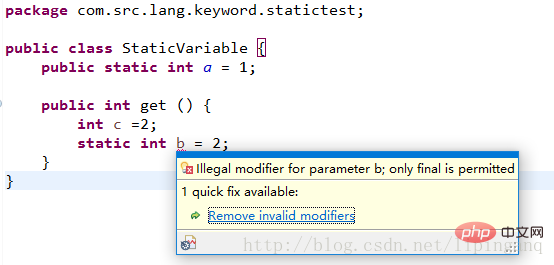What are java static variables
In Java, static variables refer to variables of classes modified by static; static variables are shared by all class instance objects and have only one copy in memory, if and only if the class is loaded for the first time. is initialized.
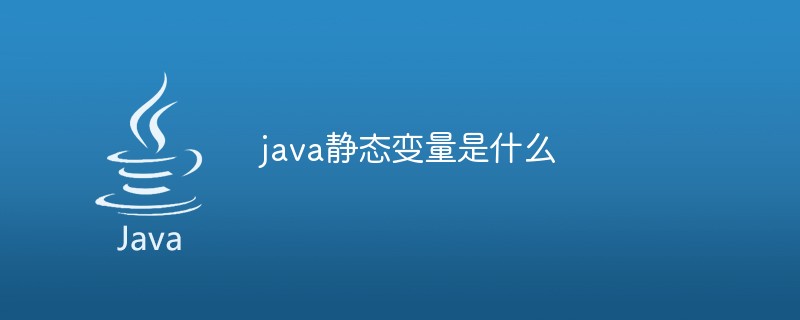
The operating environment of this tutorial: windows7 system, java8 version, DELL G3 computer.
1. JVM runtime data area
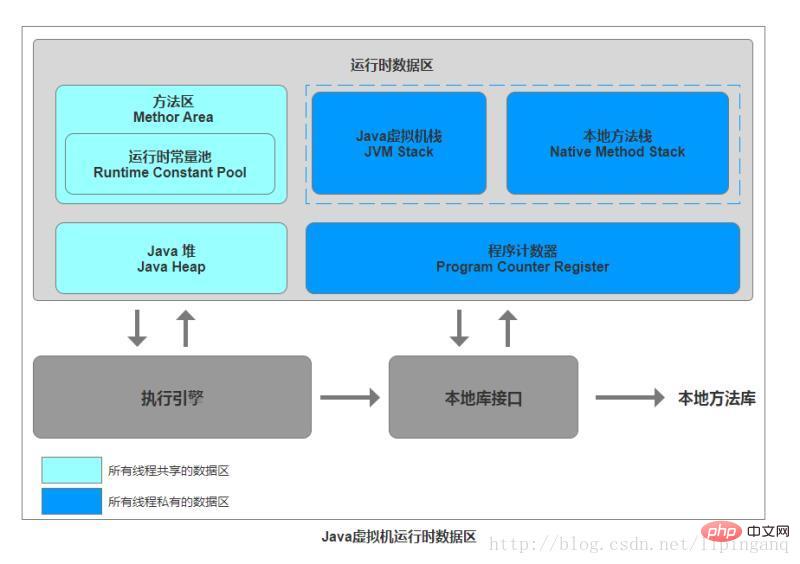
- The Java heap stores almost all object instances and is shared by all threads
- The method area (permanent generation), like the Java heap, is a memory area shared by each thread. It is used to store class information, constants, static variables, etc. that have been loaded by the virtual machine.
2. static variables
Variables of a class modified by static are also called static variables. Non-static variables are also called instance variables
The difference between static variables and instance variables is:
- Static variables are shared by all class instance objects, and there is only one in memory A copy if and only if it is initialized when the class is first loaded.
- Instance variables are owned by the instance object. They are initialized when the object is created. There are multiple copies. The copies owned by each instance object do not affect each other.
public class MyStatic {
// 静态变量
private static int index = 0;
// 实例变量
private int count = 0;
public void inc() {
index++;
count++;
}
public String get() {
return "静态变量index = " + index + ", 实例变量count = " + count;
}
}/**
* index是静态变量
* count是实例变量
* */
public class StaticVariableTest {
public static void main(String[] args) {
MyStatic myStatic1 = new MyStatic();
MyStatic myStatic2 = new MyStatic();
MyStatic myStatic3 = new MyStatic();
myStatic1.inc();
System.out.println("myStatic1的index、count增加1:");
System.out.println("myStatic1的" + myStatic1.get());
System.out.println("myStatic2的" + myStatic2.get());
System.out.println("myStatic3的" + myStatic3.get() + "\n");
myStatic2.inc();
System.out.println("myStatic2的index、count增加1:");
System.out.println("myStatic1的" + myStatic1.get());
System.out.println("myStatic2的" + myStatic2.get());
System.out.println("myStatic3的" + myStatic3.get() + "\n");
myStatic3.inc();
System.out.println("myStatic3的index、count增加1:");
System.out.println("myStatic1的" + myStatic1.get());
System.out.println("myStatic2的" + myStatic2.get());
System.out.println("myStatic3的" + myStatic3.get());
}
}Running results:

It can be seen that:
- The static variable index is shared by multiple object instances
- The instance object count is multiple Object instance private
myStatic1的index、count增加1: myStatic1的静态变量index = 1, 实例变量count = 1 myStatic2的静态变量index = 1, 实例变量count = 0 myStatic3的静态变量index = 1, 实例变量count = 0 myStatic2的index、count增加1: myStatic1的静态变量index = 2, 实例变量count = 1 myStatic2的静态变量index = 2, 实例变量count = 1 myStatic3的静态变量index = 2, 实例变量count = 0 myStatic3的index、count增加1: myStatic1的静态变量index = 3, 实例变量count = 1 myStatic2的静态变量index = 3, 实例变量count = 1 myStatic3的静态变量index = 3, 实例变量count = 1
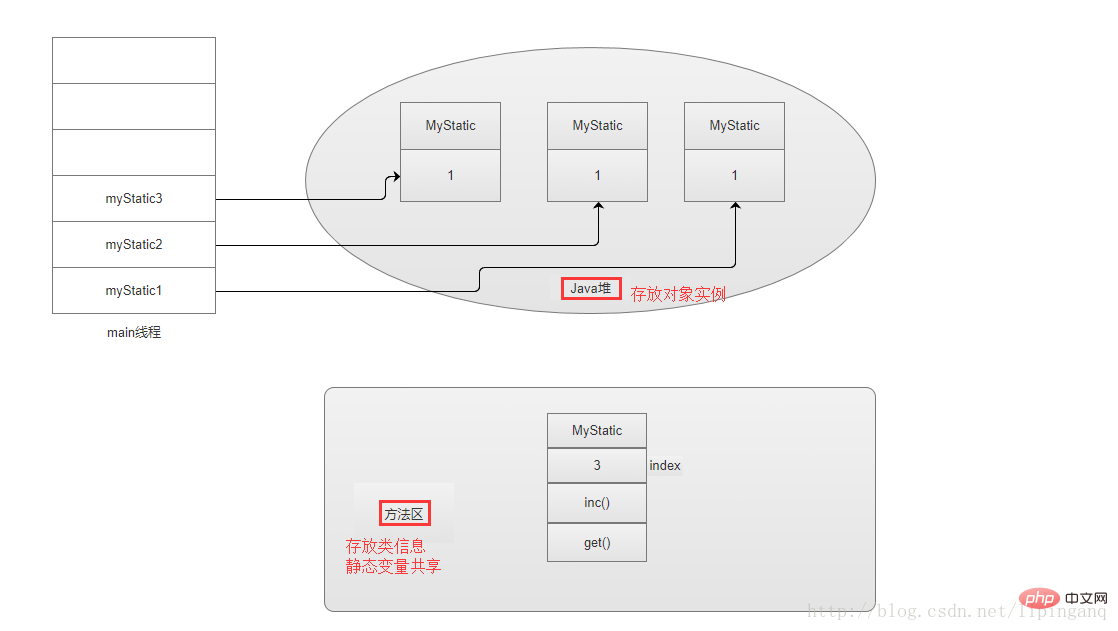
3. Misunderstanding of static variables
3.1 Static cannot act on local variables
- static in C/C can scope local variables
- static in Java is not allowed to modify local variables.
Don't ask why, this is a requirement of Java grammar.
3.2 this can access static variables
Although static variables are independent of objects, it does not mean that they cannot be accessed through object instances. , all static methods and static variables can be accessed through object instances (as long as the access rights are sufficient).
This represents the current object instance, and static variables are shared by all objects, so static variables can be accessed through this
public class StaticVariable {
public static int index = 1;
public static void main(String[] args) {
StaticVariable staticVariable = new StaticVariable();
staticVariable.get();
}
private void get() {
int index = 2;
System.out.println(this.index);
}
}Running results:

3.3 static will not change the access permissions of class members
The static keyword in Java will not affect the scope of variables or methods. In Java, the only keywords that can affect access rights are private, public, and protected (including package access rights)
public class MyStatic {
public static int index1 = 1;
// 静态变量
private static int index2 = 0;
}
public class StaticVariableTest {
public static void main(String[] args) {
System.out.println(MyStatic.index1);
System.out.println(MyStatic.index2);
}
}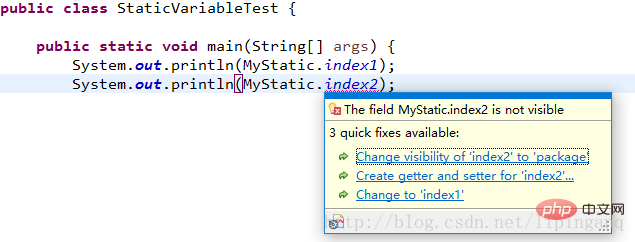
Recommended related video tutorials: Java video tutorial
The above is the detailed content of What are java static variables. For more information, please follow other related articles on the PHP Chinese website!

Hot AI Tools

Undresser.AI Undress
AI-powered app for creating realistic nude photos

AI Clothes Remover
Online AI tool for removing clothes from photos.

Undress AI Tool
Undress images for free

Clothoff.io
AI clothes remover

AI Hentai Generator
Generate AI Hentai for free.

Hot Article

Hot Tools

Notepad++7.3.1
Easy-to-use and free code editor

SublimeText3 Chinese version
Chinese version, very easy to use

Zend Studio 13.0.1
Powerful PHP integrated development environment

Dreamweaver CS6
Visual web development tools

SublimeText3 Mac version
God-level code editing software (SublimeText3)

Hot Topics
 1382
1382
 52
52
 Perfect Number in Java
Aug 30, 2024 pm 04:28 PM
Perfect Number in Java
Aug 30, 2024 pm 04:28 PM
Guide to Perfect Number in Java. Here we discuss the Definition, How to check Perfect number in Java?, examples with code implementation.
 Weka in Java
Aug 30, 2024 pm 04:28 PM
Weka in Java
Aug 30, 2024 pm 04:28 PM
Guide to Weka in Java. Here we discuss the Introduction, how to use weka java, the type of platform, and advantages with examples.
 Smith Number in Java
Aug 30, 2024 pm 04:28 PM
Smith Number in Java
Aug 30, 2024 pm 04:28 PM
Guide to Smith Number in Java. Here we discuss the Definition, How to check smith number in Java? example with code implementation.
 Java Spring Interview Questions
Aug 30, 2024 pm 04:29 PM
Java Spring Interview Questions
Aug 30, 2024 pm 04:29 PM
In this article, we have kept the most asked Java Spring Interview Questions with their detailed answers. So that you can crack the interview.
 Break or return from Java 8 stream forEach?
Feb 07, 2025 pm 12:09 PM
Break or return from Java 8 stream forEach?
Feb 07, 2025 pm 12:09 PM
Java 8 introduces the Stream API, providing a powerful and expressive way to process data collections. However, a common question when using Stream is: How to break or return from a forEach operation? Traditional loops allow for early interruption or return, but Stream's forEach method does not directly support this method. This article will explain the reasons and explore alternative methods for implementing premature termination in Stream processing systems. Further reading: Java Stream API improvements Understand Stream forEach The forEach method is a terminal operation that performs one operation on each element in the Stream. Its design intention is
 TimeStamp to Date in Java
Aug 30, 2024 pm 04:28 PM
TimeStamp to Date in Java
Aug 30, 2024 pm 04:28 PM
Guide to TimeStamp to Date in Java. Here we also discuss the introduction and how to convert timestamp to date in java along with examples.
 Java Program to Find the Volume of Capsule
Feb 07, 2025 am 11:37 AM
Java Program to Find the Volume of Capsule
Feb 07, 2025 am 11:37 AM
Capsules are three-dimensional geometric figures, composed of a cylinder and a hemisphere at both ends. The volume of the capsule can be calculated by adding the volume of the cylinder and the volume of the hemisphere at both ends. This tutorial will discuss how to calculate the volume of a given capsule in Java using different methods. Capsule volume formula The formula for capsule volume is as follows: Capsule volume = Cylindrical volume Volume Two hemisphere volume in, r: The radius of the hemisphere. h: The height of the cylinder (excluding the hemisphere). Example 1 enter Radius = 5 units Height = 10 units Output Volume = 1570.8 cubic units explain Calculate volume using formula: Volume = π × r2 × h (4
 How to Run Your First Spring Boot Application in Spring Tool Suite?
Feb 07, 2025 pm 12:11 PM
How to Run Your First Spring Boot Application in Spring Tool Suite?
Feb 07, 2025 pm 12:11 PM
Spring Boot simplifies the creation of robust, scalable, and production-ready Java applications, revolutionizing Java development. Its "convention over configuration" approach, inherent to the Spring ecosystem, minimizes manual setup, allo




